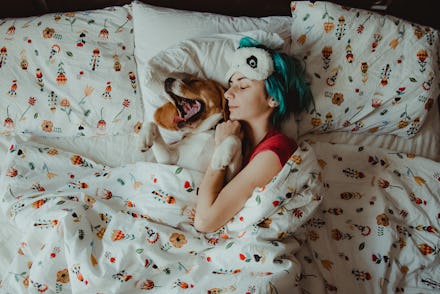The curse of being a light sleeper — and how to reverse it

I’m a light sleeper. The subtlest noise — whether a cough, or the clink of dishes in the sink — startles me, and I typically awaken once or twice a night. My partner, on the other hand, will probably sleep through the apocalypse. In fact, he probably would’ve completely missed an earthquake that recently rattled our bedroom from floor to ceiling, had I not shaken him and hissed “Earthquake!” into his ear. But what exactly does it mean to be a light sleeper? Why do I rouse so easily, while my partner remains blissfully asleep — and, importantly, can I make myself a heavy sleeper?
First, let’s walk through what happens, at a biological level, when you sleep. Your body takes around one-and-a-half to two hours to go through four stages of sleep: Stages 1, 2, and 3, followed by rapid eye movement, or REM sleep, explains Ramiz Fargo, a sleep medicine specialist at Loma Linda University Health. You typically cycle through these stages around four or five times a night. It’s easier to awaken from Stages 1 and 2, or light sleep, than it is to awaken from Stage 3 and REM sleep, or deep sleep. On average, people spend about 5% of their time sleeping in Stage 1, 50% in Stage 2, 20% in Stage 3, and 20% in REM sleep.
“Light sleeper” and “heavy sleeper” aren’t clinical terms that physicians use, says Daniel Barone, a sleep medicine specialist at Weill Cornell Medicine. When you label yourself as such, what you really mean is that you tend to spend an above-average amount of time in light or heavy stages of sleep. A self-professed light sleeper is “probably not getting into the deeper stages of sleep,” Barone says. “Their brain is always in light sleep, and it’s easier for them to get out of it.” The opposite holds true for heavy sleepers.
A number of factors can affect whether you’re a light or heavy sleeper. You might be genetically predisposed to spending more time in light or heavy sleep, Fargo tells Mic. Women are also slightly more likely than men to be light sleepers, which might also have something to do with why they're more prone to insomnia. As you age, you spend increasingly more time in light sleep.
Medical issues, such as anxiety, depression, sleep apnea, and chronic pain can also cause you to spend more time in light sleep. Think of these stressors as someone basically tapping you on the shoulder every time you slip into deep sleep. “Whatever the trigger is… it keeps knocking you back into the lighter stages of sleep and will prevent you from having a restorative, deep sleep,” Fargo says. Antidepressants and other medications can also play a role, and so can lifestyle habits. For instance, napping a bunch during the day could make it harder for you to enter deep sleep at night.
Based on all these factors, it’s no wonder I’m a light sleeper. I come from a long line of light sleepers on my mom’s side, so I’m pretty sure I’m genetically predisposed to spending more time in light sleep. I also have an anxiety disorder, and I’m a woman. Check, check, and check. But does that mean I’m doomed to be a light sleeper forever?
Some factors, like genetics, lie beyond your control. The good news is, there are plenty of other factors you can address to improve your chances of clocking in enough time in deep sleep, like your lifestyle habits. If you have the means, book an appointment with a sleep specialist that you dig up online; they're well equipped to help you pinpoint and tackle the underlying problem.
If you want to try and tackle this without a doctor, you can start by getting into bed at the same time every night, and setting an alarm for the same time every morning, even on weekends, Fargo says. Avoid napping, which can make it hard to fall asleep at night. Also, strategic physical activity can help a lot; working out in the morning or afternoon on a regular basis can help your body at bedtime, potentially reducing anxiety and pain (although working out too close to bedtime may hinder sleep).
Try not to eat dinner any later than 2 to 3 hours before you turn in for the night, Fargo adds; otherwise, you might boost your risk of acid reflux, or even nightmares. Barone suggests popping over-the-counter, time-release melatonin, a hormone that helps promote sleep, as well as meditating before bedtime.
Creating an environment conducive to sleep can help, too. Make sure your bedroom is dark, and avoid scrolling through your devices for a few hours before bedtime, since the light they emit prevent your brain from secreting melatonin. Play white noise — which can be as simple as turning on a fan — to filter out the neighbor’s dog barking and other random noises that might awaken you throughout the night, Fargo says. Barone adds that setting the temperature between the high 60s and low 70s (Fahrenheit) also promotes deep sleep.
Ideally, you’d sleep for 7 to 9 hours a night and wake up refreshed, sans alarm. Sleeping 10 or more hours a night is atypical, and chances are, doing so still leaves you feeling drowsy, Fargo says. It likely indicates an underlying problem stemming from drug use, medication, or a health issue. At that point, it’s probably best to speak to a physician.
As for me, I’ve accepted that I’ll never truly be a heavy sleeper — but at least I know I can take some steps to sleep a little more deeply.